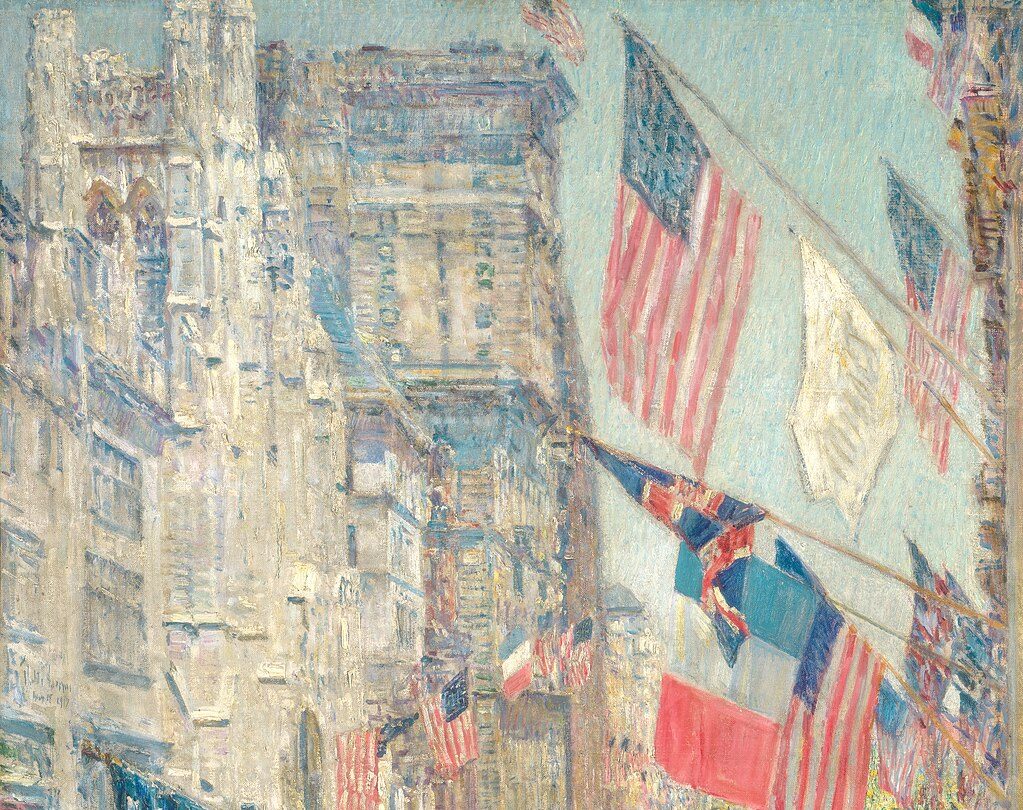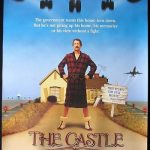Huntsville, AL. It is with admitted mischief that I chose this title. One of the dangers of such a title is that I could get bogged down merely defining terms, namely “What’s a Christian Nationalist?” and “Who was Stephen Leacock?”
I will try to answer these questions briefly so I can get to Leacock’s delightful wisdom itself. But first things first. One can find multiple definitions for “Christian Nationalism.” The term has come into prominence recently with some authors pointing out the goodness of it, others the dangers of it, and others reporting its recent ascendance. In the last few months the internet searches spiked significantly. Traditionally, the term “nationalism” means dedication to one’s nation over and above other loyalties. Nationalism rose in Europe in the mid-1800’s and is viewed by most historians as a cause of WWI. To add “Christian” to that is somewhat odd, given that nationalism was largely a secular movement in Europe and citizens of the United States were traditionally much more dedicated to their particular states than to the nation as a whole, at least until the late 1800s. Many in conservative Christian circles now use the term as shorthand for “a country with overt Christian loyalty.” Again, this is odd for us, considering the first amendment forbids religious tests at the federal level. I am not decrying the Christian origins of the first colonists or their desire to establish a godly commonwealth, just pointing out that once we were established as a country, we went out of our way to escape national religious branding.
Britain and her commonwealths, on the other hand, are another matter. No one could watch the recent funeral of Queen Elizabeth and escape the overtly Christian trappings surrounding her death. This was apparent in not just the funeral but the lead-up to it: the liturgy, awash with Scripture reading and prayer, the symbols (all of which point to England’s Christian heritage), and the sermon preached by Archbishop Justin Welby (which is probably the largest single gospel proclamation watched in world history, estimated at around 4 billion). Despite the rampant secularism of Britain, the remaining symbolism is inescapable. Sadly, many view the funeral as one of the last displays of Christianity in the commonwealth. We don’t know.
Secularism has been an ongoing process in the West. The last public leader to refer to the West as “Christendom” was Winston Churchill, and since that time it has receded more and more. Yet there are still people working to revive and conserve the vestiges of public Christian virtue that remain. One of those happened to be the greatest Canadian humorist of all time—Stephen Leacock.
Born in England in 1869, Leacock moved with his family to Ontario where his parents bought a farm. He attended college in Toronto and later taught while supporting his family back home. He felt much more at home in the Tory (conservative) party and greater affinity towards smaller, rural, decentralized governments than large, liberal ones. He pursued a Ph.D. in economics at the University of Chicago, but his education was more than academic. He saw the way factory workers and the poor were treated by big business and the local government and was appalled. He was also concerned with the growing movement among Canadians to join with the U.S. as a republic rather than remain with the British crown.
His first books, Elements of Political Science and later The Unsolved Riddle of Social Justice, were both aimed at the problems of American-style capitalism, which inherently pushes business into the role of governing and works closely with a central government to maximize profit while minimizing responsibility for resulting problems. His belief was largely based on the Tory British Prime Minister Benjamin Disraeli, whose “One Nation” conservatism established limits on the all-encompassing growth of business into the everyday lives of the public. Leacock desired for Canada to remain free from the secularizing, business-first model of the United States and pursue a conservatism that would protect Canada’s interests rather than handing her well-being to the colonizing influence of England or the U.S.
Thus far, there’s been a lot about politics and nothing about humor. Yet it is his humor that sets Stephen Leacock stands apart from other political activists. While Leacock was delivering speeches, teaching at the University of McGill, and campaigning to preserve the heart and soul of Canada, he put his vision into writing. In 1911, Leacock published his third book of fiction, entitled Sunshine Sketches of a Little Town. His first two, Nonsense Novels and Literary Lapses were collections of short stories. Set in the fictional town of Mariposa, it depicts life in a small, imperfect but lovely town in central Canada. Neither overly romantic nor cynical, Mariposa is a place where love of the land, local culture, and neighborly virtue abounds. He introduces it like this:
Mariposa is not a real town. On the contrary, it is about seventy or eighty of them. You may find them all the way from Lake Superior to the sea, with the same square streets and the same maple trees and the same churches and hotels… The inspiration of the book,—a land of hope and sunshine where little towns spread their square streets and their trim maple trees beside placid lakes almost within echo of the primeval forest,—is large enough. If it fails in its portrayal of the scenes and the country that it depicts the fault lies rather with an art that is deficient than in an affection that is wanting.
There’s Jefferson Thorpe, the barber and aspiring philanthropist, who speculated in mining stock, became rich, lost it all, and quietly went back to being a barber, to the delight of the men in Mariposa. There’s old Dr. Gallagher, who collects Indian relics and studies Canadian history. And who can forget the Rev. Drone, kindly vicar of the local Anglican church? Upon fulfilling his daily duties, Rev. Drone would fish while reading Greek, and amuse children by making kites and steamboats for them: “It was fortunate for the Dean that he had the strange interest and aptitude for mechanical advices which he possessed, or otherwise this kind of thing would have been too cruel an imposition. But the Rev. Mr. Drone had a curious liking for machinery. I think I never heard him preach a better sermon than the one on Aeroplanes (Lo, what now see you on high Jeremiah Two).”
He goes on to tell in three chapters the story of Rev. Drone, whose church building is under a mountain of debt: “It was only when the agent of the building society and a representative of the Hosanna Pipe and Steam Organ Co. (Limited), used to call for quarterly payments that he was suddenly reminded of the fact. Always after these men came round the Dean used to preach a special sermon on sin, in the course of which he would mention that the ancient Hebrews used to put unjust traders to death,—a thing of which he spoke with Christian serenity.” They go to great lengths to overcome the debt, only to fail. In the final chapter about the church, “Beacon on a Hill,” when all seems lost and the Dean is about to resign, the miraculous happens. The eucatastrophe is reminiscent of Chesterton, and all is restored.
The description of him and most of the other characters of Mariposa is kind, lightly satirical, but most of all, loving. This is because Leacock based the characters on real people he knew in Orilla, Ontario. There is no attempt at distancing oneself from the common folk; these were his people and he loved them. He wanted to protect them from the encroaching liberalism and modernism that wrecked communal life. Leacock is not just defending a random ideal—he’s defending his home. When the author loves specific people in a specific place, the story transcends its provincial setting and becomes timeless. This is the same reason Wendell Berry’s fiction based around Port Royal, KY, remains. Both authors love the people about whom they are writing. Love for Orilla and for Ontario is what moved Stephen Leacock to war against the twin dragons of liberal capitalism and brute socialism.
The counterpart to Mariposa, published three years later in 1914, is titled Arcadian Adventures of the Idle Rich. Based in the fictional American city of Plutoria (a Chicago-like place), we see what happens when making money and achieving status become the all-consuming concern of a place. It’s not that Leacock simplistically decries cities and exalts small towns. His gentle satire is reserved for those who make rugged-individualism and materialism their calling cards. Just as when people seek the good of their neighbors together, whether within a small town or a larger city, good results come, so when people seek only their individual wealth for its own sake, the size of their community makes little difference. We see this latter dynamic more often in cities because there is greater opportunity to achieve wealth and status in cities than in small towns or villages. Even Sheriff Andy Taylor, at the conclusion of The Andy Griffith Show, leaves Mayberry to seek a better opportunity in a larger town.
The colorfully titled chapter, “The Yahi-Bahi Oriental Society of Mrs. Rasselyer-Brown,” begins this way:
Mrs. Rasselyer-Brown lived on Plutoria Avenue in a vast sandstone palace, in which she held those fashionable entertainments which have made the name of Rasselyer-Brown what it is. Mr. Rasselyer-Brown lived there also… In other words, Mr. Rasselyer-Brown was a severe handicap to Mrs. Rasselyer-Brown. He was more than that; the word isn’t strong enough. He was, as Mrs. Rasselyer-Brown herself confessed to her confidential circle of three hundred friends, a drag… Even in the early years of their married life, some twenty or twenty-five years ago, her husband had been a drag on her by being in the coal and wood business. It is hard for a woman to have to realize that her husband is making a fortune out of coal and wood and that people know it. It ties one down… There is nothing more stifling than a husband who doesn’t know a Giotto from a Carlo Dolci, but who can distinguish nut coal from egg and is never asked to dinner without talking about the furnace.
The story continues with Mrs. Rasselyer-Brown trying to inject a degree of Oriental culture into her group. Let us say the results are well-deserved.
Leacock, a faithful Anglican, had little use for religious pretension. Plutoria’s Presbyterians and Episcopalians receive due skewering. We pick up on these dynamics in this description of the romantic intentions of a Mr. Peter Spillikins:
Later on, when Spillikins went into business and into society, the same fate pursued him. He loved, for at least six months, Georgiana McTeague, the niece of the presbyterian minister of St. Osoph’s. He loved her so well that for her sake he temporarily abandoned his pew at St. Asaph’s, which was Episcopalian, and listened to fourteen consecutive sermons on hell. But the affair got no further than that. Once or twice, indeed, Spillikins walked home with Georgiana from church and talked about hell with her; and once her uncle asked him into the manse for cold supper after evening service, and they had a long talk about hell all through the meal and upstairs in the sitting-room afterwards. But somehow Spillikins could get no further with it. He read up all he could about hell so as to be able to talk with Georgiana, but in the end it failed: a young minister fresh from college came and preached at St. Osoph’s six special sermons on the absolute certainty of eternal punishment, and he married Miss McTeague as a result of it.
Leacock later presents us with a contrast of two ministers, Rev. Furlong (Episcopalian) and Dr. McTeague (Presbyterian):
The Reverend Edward Fareforth Furlong of St. Asaph’s was a man who threw his whole energy into his parish work. The subtleties of theological controversy he left to minds less active than his own. His creed was one of works rather than of words, and whatever he was doing he did it with his whole heart. Whether he was lunching at the Mausoleum Club with one of his church wardens, or playing the flute—which he played as only the episcopal clergy can play it—accompanied on the harp by one of the fairest of the ladies of his choir, or whether he was dancing the new episcopal tango with the younger daughters of the elder parishioners, he threw himself into it with all his might. He could drink tea more gracefully and play tennis better than any clergyman on this side of the Atlantic. He could stand beside the white stone font of St. Asaph’s in his long white surplice holding a white-robed infant, worth half a million dollars, looking as beautifully innocent as the child itself, and drawing from every matron of the congregation with unmarried daughters the despairing cry, “What a pity that he has no children of his own!”
We’re told later that no man could preach shorter sermons or explain away the book of Genesis more agreeably than Rev. Furlong.
Dr. McTeague, Presbyterian pastor and honorary professor of philosophy at Plutoria University, is another matter. The university president wants him to leave, but he won’t. They trustees cut his salary in half—he still won’t depart:
Then, to the surprise of everybody he refused to give up his lectures in philosophy. He said he felt a call to give them. The salary, he said, was of no consequence. He wrote to Mr. Furlong senior (the father of the episcopal rector and honorary treasurer of the Plutoria University) and stated that he proposed to give his lectures for nothing. The trustees of the college protested… While fully admitting that Dr. McTeague’s lectures were well worth giving for nothing, they begged him to reconsider his offer. But he refused; and from that day on, in spite of all offers that he should retire on double his salary, that he should visit the Holy Land, or Syria, or Armenia, where the dreadful massacres of Christians were taking place, Dr. McTeague clung to his post with a tenacity worthy of the best traditions of Scotland. His only internal perplexity was that he didn’t see how, when the time came for him to die, twenty or thirty years hence, they would ever be able to replace him.
Another unique element to Arcadian Adventures is the consistent mentioning of the poorer, less stable parts of town. Plutoria has these parts, and they are mentioned consistently. The wealth that abounds does not make its way to those part. Nonetheless, you can still detect sympathy, not derision, toward all the people of Plutoria. They were human beings, God’s fallen creatures, who have chosen the wrong path. Despite their choices, hope remains.
Stephen Leacock continued writing well past 1914. Likewise he continued to support candidates for office while teaching political economy (economics) at McGill University, until his forced retirement in 1936. He was, it seems, less obstinate than Dr. McTeague. For the next eight years he continued to write and speak on behalf of his beloved Ontario and for Canada as a nation. Undergirding his work was not a desire to restore a previous version of Canada, but to preserve the gifts God had given: the best traditions of the past, the communities in which we live, the surrounding creation, and the dignity of man. I can think of no better summary of Leacock’s work that that given by Ronald Dart in The North American High Tory Tradition:
Leacock stood very much within such a large and organic view of life, a view and vision in which the life of religion, education-culture and politics were all organically connected and integrated. It is in this sense that Leacock is very much a Tory of the older way, a Tory who only too keenly realized that his Anglican faith was about being engaged in a nationalist way on political issues, but also being deeply concerned about preserving and protecting the classical way of humanist education.
NB: I owe great thanks to Professor Ronald Dart, whose book The North American High Tory Tradition introduced me to the
wisdom of Leacock.
Image Credit: Detail from Childe Hassam’s “Allies Day,” (1917).





2 comments
Brian
I’d say easily 99.99% of the times I’ve heard the term “Christian nationalist” it’s been in a pejorative sense from people who have no idea what either nationalism or Christianity mean other than “things I don’t like/people who are bad”.
Thanks for the writing, this sounds very interesting.
And a wonderful and blessed Thanksgiving to All.
Rob G
Thanks for this — great stuff. I bought a copy of ‘Sunshine Sketches’ years ago on the recommendation of someone, I don’t remember who, who said that it was something like a Canadian Wodehouse. I never read it, and in fact I’m not sure where my copy is, but the search is on!
Comments are closed.